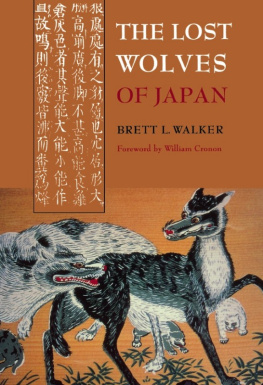Brett L. Walker - The Lost Wolves of Japan
Here you can read online Brett L. Walker - The Lost Wolves of Japan full text of the book (entire story) in english for free. Download pdf and epub, get meaning, cover and reviews about this ebook. publisher: University of Washington Press, genre: Romance novel. Description of the work, (preface) as well as reviews are available. Best literature library LitArk.com created for fans of good reading and offers a wide selection of genres:
Romance novel
Science fiction
Adventure
Detective
Science
History
Home and family
Prose
Art
Politics
Computer
Non-fiction
Religion
Business
Children
Humor
Choose a favorite category and find really read worthwhile books. Enjoy immersion in the world of imagination, feel the emotions of the characters or learn something new for yourself, make an fascinating discovery.
- Book:The Lost Wolves of Japan
- Author:
- Publisher:University of Washington Press
- Genre:
- Rating:5 / 5
- Favourites:Add to favourites
- Your mark:
- 100
- 1
- 2
- 3
- 4
- 5
The Lost Wolves of Japan: summary, description and annotation
We offer to read an annotation, description, summary or preface (depends on what the author of the book "The Lost Wolves of Japan" wrote himself). If you haven't found the necessary information about the book — write in the comments, we will try to find it.
The Lost Wolves of Japan — read online for free the complete book (whole text) full work
Below is the text of the book, divided by pages. System saving the place of the last page read, allows you to conveniently read the book "The Lost Wolves of Japan" online for free, without having to search again every time where you left off. Put a bookmark, and you can go to the page where you finished reading at any time.
Font size:
Interval:
Bookmark:

WEYERHAEUSER ENVIRONMENTAL BOOKS
William Cronon, Editor
Weyerhaeuser Environmental Books explore human relationships with natural environments in all their variety and complexity. They seek to cast new light on the ways that natural systems affect human communities, the ways that people affect the environments of which they are a part, and the ways that different cultural conceptions of nature profoundly shape our sense of the world around us.WEYERHAEUSER ENVIRONMENTAL BOOKS
The Natural History of Puget Sound Country by Arthur R. Kruckeberg
Forest Dreams, Forest Nightmares: The Paradox of Old Growth in the Inland West by Nancy Langston
Landscapes of Promise: The Oregon Story, 18001940 by William G. Robbins
The Dawn of Conservation Diplomacy: U.S.-Canadian Wildlife Protection Treaties in the Progressive Era by Kurkpatrick Dorsey
Irrigated Eden: The Making of an Agricultural Landscape in the American West by Mark Fiege
Making Salmon: An Environmental History of the Northwest Fisheries Crisis by Joseph E. Taylor III
George Perkins Marsh, Prophet of Conservation by David Lowenthal
Driven Wild: How the Fight against Automobiles Launched the Modern Wilderness Movement by Paul S. Sutter
The Rhine: An Eco-Biography, 18152000 by Mark Cioc
Where Land and Water Meet: A Western Landscape Transformed by Nancy Langston
The Nature of Gold: An Environmental History of the Alaska/Yukon Gold Rush by Kathryn Morse
Faith in Nature: Environmentalism as Religious Quest by Thomas R. Dunlap
Landscapes of Conflict: The Oregon Story, 19402000 by William G. Robbins
The Lost Wolves of Japan by Brett L. Walker
Wilderness Forever: Howard Zahniser and the Path to the Wilderness Act by Mark Harvey
On the Road Again: Montanas Changing Landscape by William Wyckoff
Public Power, Private Dams: The Hells Canyon High Dam Controversy by Karl Boyd Brooks
Windshield Wilderness: Cars, Roads, and Nature in Washingtons National Parks by David Louter
Native Seattle: Histories of the Crossing-Over Place by Coll Thrush
The Country in the City: The Greening of the San Francisco Bay Area by Richard Walker
WEYERHAEUSER ENVIRONMENTAL CLASSICS
The Great Columbia Plain: A Historical Geography, 18051910 by D. W. Meinig
Mountain Gloom and Mountain Glory: The Development of the Aesthetics of the Infinite by Marjorie Hope Nicolson
Tutira: The Story of a New Zealand Sheep Station by Herbert Guthrie-Smith
A Symbol of Wilderness: Echo Park and the American Conservation Movement by Mark W. T. Harvey
Man and Nature: Or, Physical Geography as Modified by Human Action by George Perkins Marsh; edited and annotated by David Lowenthal
Conservation in the Progressive Era: Classic Texts edited by David Stradling
Cycle of Fire by Stephen J. Pyne
Fire: A Brief History
World Fire: The Culture of Fire on Earth
Vestal Fire: An Environmental History, Told through Fire, of Europe and Europes Encounter with the World
Fire in America: A Cultural History of Wildland and Rural Fire
Burning Bush: A Fire History of Australia
The Ice: A Journey to Antarctica
BRETT L. WALKER
Foreword by William Cronon
UNIVERSITY OF WASHINGTON PRESS
Seattle and London

The Lost Wolves of Japan has been published with the assistance of a grant from the Weyerhaeuser Environmental Books Endowment, established by the Weyerhaeuser Company Foundation, members of the Weyerhaeuser family, and Janet and Jack Creighton.
2005 by the University of Washington Press
Designed by Pamela Canell
Maps by Dale Martin
eISBN 13: 978-0-295-98993-8
ISBN 13: 978-0-295-98814-6
All rights reserved.
University of Washington Press
P.O. Box 50096, Seattle, WA 98145
www.washington.edu/uwpress
Library of Congress Cataloging-In-Publication Data
Walker, Brett L, 1967
The lost wolves of Japan / Brett L. Walker;
foreword by William Cronon.1st ed.
(Weyerhaeuser environmental books)
ISBN 0-295-98492-9 (hardback: alk. paper)
ISBN 13: 978-0-295-98492-6
1. WolvesJapan. 2. Extinct animalsJapan. book.
QL737.C22W33 2005 599.773'0952dc22 2004031040
FOR MY PARENTS, LINDA HARBERS AND NELSON WALKER
by William Cronon
Science and the Creation of the Japanese Wolf
Culture and the Creation of Japan's Sacred Wolves
The Conflicts between Wolf Hunters and Rabid Man-Killers in Early Modern Japan
Meiji Modernization, Scientific Agriculture, and Destroying the Hokkaido Wolf
Wolf Bounties and the Ecologies of Progress
Wolf Extinction Theories and the Birth of Japan's Discipline of Ecology
Wolves and Bears Killed and Bounties Paid by Administrative Region, 18771881
A Strange Violent Intimacy
William Cronon
Wolves and other big predators have long loomed large in the history, literature, and folklore of human interactions with the natural world. Although there is wide variation from culture to culture in the ways these creatures are depicted, they rarely surface in our collective memory without standing in one way or another for the fierce autonomy of nature in resisting the visions of order that people in the modern era like to imagine they can impose on the world around them. Wolves in particular occupy a peculiarly fraught place in our cultural conceptions of nature, since their intelligence, their communication skills, their sociability, their cooperative hunts, and, not least, their close kinship to the domesticated dogs that are arguably our closest animal companions make them seem uniquely familiar to us. These and other qualities enable us to gaze on these creatures and see in them powerful reflections of some of our own most cherished human qualities.
And yet wolves also contest our dominion of the landscapes from which we wrest our livelihoods, threatening our comfortable conviction that we are safely in control of nature. They kill our animals and, under rare circumstances, can even feast on human flesh to prove that we too can become prey to chains of predation that lead not just to our own stomachs, but to the stomachs of other animals as well. No doubt because of this strange violent intimacy between ourselves and wolves, the history of our relationship is bathed in blood, so much so that nation after nation over the past two hundred years has eventually succeeded in driving wolves to the brink of local extinction and beyond. It is no accident that they have come to symbolizethe wildest places on earth, for until very recently we have systematically extirpated them from almost everywhere else.
Much has been written about the environmental history of wolves in the United States, in part because of the striking reversal in American attitudes toward predators during the middle decades of the twentieth century. Aldo Leopold's classic essay Thinking Like a Mountain usually serves as the symbolic benchmark for this change, describing as it does a landscape that underwent massive environmental degradation as deer herds exploded with the removal of large predators like wolves. The essay was a famous mea culpa for Leopold himself, since he had devoted considerable energy early in his career to promoting predator control in the American Southwest, realizing too late that his own efforts were helping destroy the very wilderness he hoped to preserve. Although Leopold's conclusions about the role of wolves in controlling deer populations have been challenged in subsequent yearshe likely exaggerated the scale of the famous Kaibab deer disaster of the 1920s, and probably overemphasized the role of wolves in controlling deer herds while underemphasizing the importance of Native American hunters in performing that same functionthe effects of his arguments on modern environmentalist attitudes toward predators have nonetheless been profound. Wolves, cougars, and grizzlies are now typically regarded as among the most important keystone species in North American ecosystems, so that their presence or absence has become one of the most widely embraced biological measures of wilderness in the United States and Canada.
Font size:
Interval:
Bookmark:
Similar books «The Lost Wolves of Japan»
Look at similar books to The Lost Wolves of Japan. We have selected literature similar in name and meaning in the hope of providing readers with more options to find new, interesting, not yet read works.
Discussion, reviews of the book The Lost Wolves of Japan and just readers' own opinions. Leave your comments, write what you think about the work, its meaning or the main characters. Specify what exactly you liked and what you didn't like, and why you think so.







![Simon Brett [Simon Brett] - Mrs. Pargeter’s Pound of Flesh](/uploads/posts/book/142156/thumbs/simon-brett-simon-brett-mrs-pargeter-s-pound.jpg)
![Simon Brett [Simon Brett] - Mrs. Pargeter’s Point of Honour](/uploads/posts/book/142155/thumbs/simon-brett-simon-brett-mrs-pargeter-s-point.jpg)
![Simon Brett [Simon Brett] - Mrs. Pargeter’s Package](/uploads/posts/book/142153/thumbs/simon-brett-simon-brett-mrs-pargeter-s.jpg)


